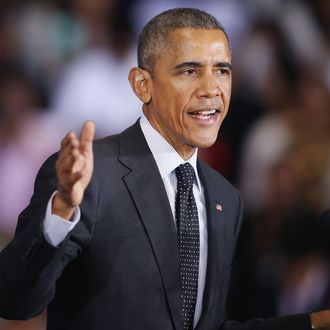
How do you fight ISIS, Boko Haram, and other extremist groups? In a speech at the end of the White House’s three-day summit on countering violent extremism, President Obama told 65 assembled nations that they need to focus on preventing the Islamic State from winning new recruits by improving economic conditions. He said citizens disappointed with their countries also need to be able to dissent and that democracy is an essential part of fighting terrorism — an argument that has appeared in presidential prescriptions for how to fight terrorism for ages. “When peaceful democratic change is impossible,” Obama said, “it feeds into the terrorist propaganda that violence is the only answer available.”
That argument was repeated by United Nations secretary-general Ban Ki-moon (“Missiles may kill terrorists, but good governance kills terrorism”) and Secretary of State John Kerry (” … you’re kind of stupid if all you do is [take out militants] and you don’t prevent more people from going to the battlefield.”)
Obama added that religious tolerance is another essential ingredient in combating the spread of extremism, saying that “the notion that the West is at war with Islam is an ugly lie. And all of us, regardless of our faith, have a responsibility to reject it.”
The president never called the groups he discussed “Islamic,” which has led to criticism so intense that Obama addressed it on Wednesday, saying of those in ISIS, “they are not religious leaders. They are terrorists. And we are not at war with Islam. We are at war with people who have perverted Islam.”
The explanation of administration word usage, unsurprisingly, did not dim disappointment from reporters and politicians. As a rule, political semantics nearly always requires ten times as much unpacking as the policies described by such language.
Criticism of the event extended across American borders, as Russia’s U.N. envoy was also unimpressed by the event. Foreign Policy relayed Vitaly Churkin’s summation of the summit: “The United States believes in its exceptionalism and it has to say at every corner that the United States is going to lead. Fine, I’m prepared to listen to those statements if they want to position themselves this way. … What the hell.”





























